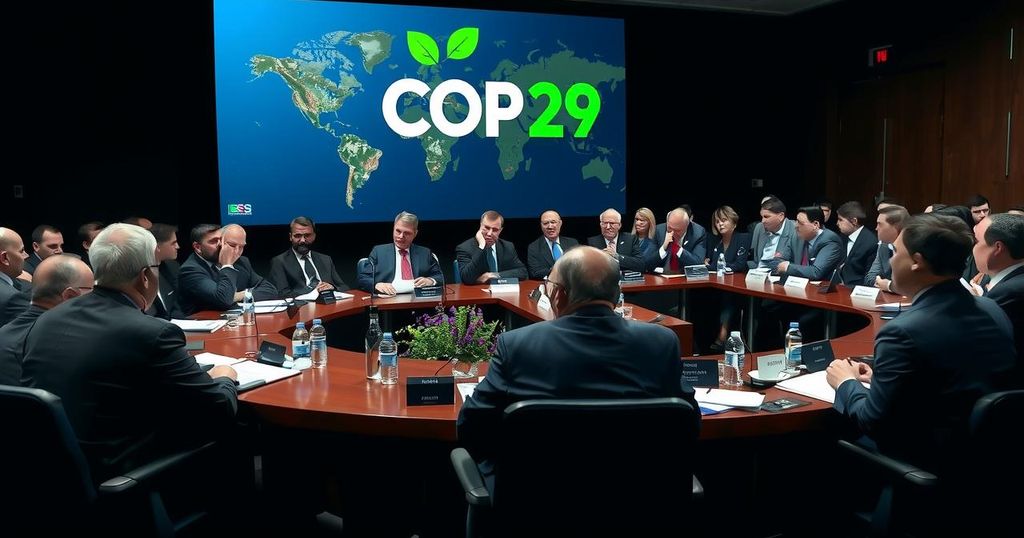COP29 has commenced in Baku, establishing carbon credit trading standards and addressing climate financing needs for vulnerable nations. The summit faces criticism over representation, dips in high-level attendance, and the geopolitical implications of its host country. Key climate commitments from the U.S. are anticipated to be announced soon.
The annual climate summit, COP29, commenced yesterday with significant developments, notably establishing a global carbon-credit trading market. Delegates at the 29th United Nations climate change conference reached a consensus on protocols governing the sale of carbon credits among nations—an initiative that has been stagnant for years. Such credits allow affluent nations, including the United States, Switzerland, and Japan, to fulfill climate obligations by purchasing emission reductions from less economically robust countries, such as those achieved through afforestation. Criticism arose regarding this arrangement, with detractors labeling it a “back-door deal” that insufficiently included diverse voices in the negotiating process. Furthermore, discussions are underway concerning the necessary financial support for vulnerable nations facing climate challenges. Current financing targets, which stand at $100 billion annually per at-risk country, are being scrutinized and may require considerable increases to meet the daunting expectations of climate resilience and clean energy transitions. COP29 is taking place in Baku, Azerbaijan, where the prominence of oil and gas—accounting for 90% of national export revenue—casts a shadow over the proceedings. The New York Times revealed that Azerbaijan’s hosting of the summit was facilitated by Russian influence, which obstructed inclusive approvals from countries opposing the invasion of Ukraine. Mukhtar Babayev, President of COP29 and former head of Azerbaijan’s state oil company, candidly admitted, “We are not famous as a green-transition ideas developer.” Attendance appears notably diminished this year, with 48 fewer heads of state participating compared to the previous year. Notable absentees include Presidents Xi Jinping and Joe Biden from the largest oil-producing countries. Additionally, Papua New Guinea has opted to boycott the summit, labeling it a “total waste of time.” Looking forward, the United States is expected to unveil revised climate commitments by the year’s end; however, these may align closely with policies anticipated to be overturned by President-elect Donald Trump. John Podesta, the chief U.S. climate diplomat, expressed disappointment regarding the election outcomes, declaring the results “bitterly disappointing” at COP29.
The Conference of the Parties (COP) is an annual summit organized by the United Nations Framework Convention on Climate Change (UNFCCC), bringing together world leaders, negotiators, and activists to address the multidimensional challenges of climate change. COP29, being the 29th iteration, aims to build upon previous agreements, particularly focusing on global carbon emissions and financing measures for vulnerable nations. Key goals include establishing a robust market for carbon credits and determining adequate financial support to aid at-risk countries in implementing effective climate action initiatives. However, this year’s gathering in Baku presents unique challenges and criticisms, with significant geopolitical implications influencing participation and discussions.
In summary, COP29 has achieved a milestone by formalizing carbon credit trading standards; however, it faces criticism for insufficient inclusivity. The need for enhanced climate financing for vulnerable nations is pressing, with calls for dramatically increased funding levels. The conference’s location in Azerbaijan, coupled with diminished head-of-state attendance and geopolitical controversies, casts a pall over its effectiveness. The forthcoming disclosures from the United States concerning modified climate pledges will further shape the future climate discourse as the summit progresses.
Original Source: www.morningbrew.com






